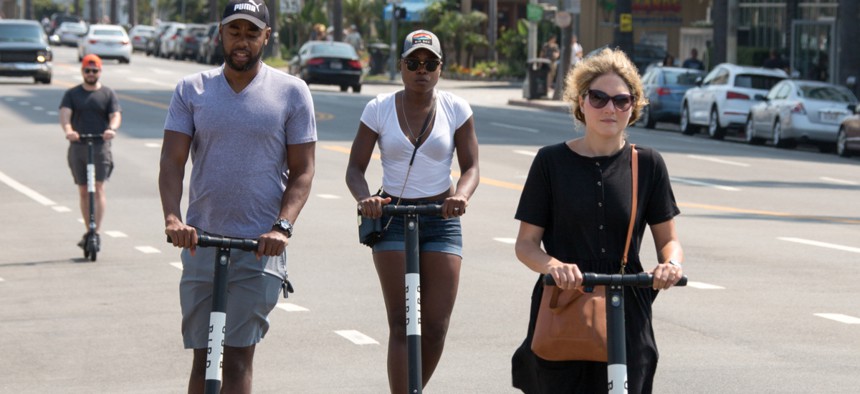Head Injuries Common in Scooter Crashes, Study Finds. Helmets Not So Much.

shutterstock

Connecting state and local government leaders
The research out of Austin, Texas examines the cases of 190 people hurt riding electric scooters.
Nearly half of 190 people injured in electric scooter crashes in Austin, Texas over a roughly three month period last year suffered head injuries, yet only one was wearing a helmet.
That’s one of the findings in a study released last month that the city’s public health department completed with assistance from the Centers for Disease Control and Prevention.
The report examines the cases of 190 people injured riding scooters between Sept. 5 and Nov. 30. It relied on data from local emergency medical services and area hospitals and incorporates information from interviews with 125 injured riders.
Another one of the study’s conclusions is that over a third of injured riders, 37 percent of them, reported that excessive speed contributed to their crash. Electric scooters, the report points out, can travel at speeds up to about 15 mph.
Over the study’s timeframe riders took a total of 936,110 scooter trips in Austin, yielding an injury rate of about 20 people per 100,000 trips. But the report also notes that it likely underestimates the prevalence of injuries from electric scooter mishaps.
Electric rental scooters have spread to cities across the U.S. during the past couple of years and arrived in Austin last April.
Lawmakers in a number of states have been taking action this year to come up with new guidelines for them—including in Texas where the state Senate this week passed a bill that would set scooter speed limits and bar the use of rented scooters on sidewalks.
A spokesperson for Austin’s transportation department said in an email on Friday that the agency is working on policy proposals related to scooter safety, and the authority the city has to regulate “shared micromobility services,” like scooters and bikes, on its streets.
The City Council is expected to discuss these issues later this month, the spokesperson added.
Among the other findings in the report were that 55 percent of the 190 people injured in scooter crashes were men, and 48 percent were 18-29 years-old—although ages ranged from 9 to 79.
Forty-eight percent of the 190 injured riders had head injuries, which included fractures, lacerations and abrasions, and 15 percent had evidence that suggested they’d experienced a traumatic brain injury, a category that includes concussions.
“Studies have shown that bicycle riders reduce the risk of head and brain injuries by wearing a helmet,” the report says. “Helmet use might also reduce the risk of head and brain injuries in the event of an e-scooter crash.”
Almost half of the overall injured riders had injuries described as “severe,” 84 percent of which included bone fractures and 45 percent nerve, tendon or ligament damage.
No injured scooter riders died during the timeframe the study looked at.
Collisions with cars weren’t as common as other types of crashes.
Even though about 55 percent of the 125 interviewed riders were traveling in the street at the time of their incident, only 10 percent were hurt by crashes with a motor vehicle.
David Spielfogel, chief policy officer for Lime, one of the companies that operates scooter rentals in Austin, described the report as important for people concerned about transportation safety and said the company was grateful for the work by the researchers.
“We look forward to further partnering with the medical community and regulators to improve safety for pedestrians, bicyclists and users of micromobility,” Spielfogel said in a statement.
“We are committed to understanding why incidents occur, how to enhance street designs, educating riders and drivers,” he added.
Paul Steely White, director of safety policy and advocacy with Bird, another scooter firm, in a statement emphasized that “cars injure 3 million people annually” and said that “to make our cities and communities more livable and safe, car usage must decline.”
“We plan to apply the insights provided by Austin Public Health’s report to our global operations, marketing campaigns, public affairs and rider education initiatives while we also further raise the bar for vehicle safety,” he said.
Ryan McConaghy is executive director of The Micromobility Coalition, a new trade association aligned with companies in the scooter rental business. He also welcomed the study.
“As policymakers pursue this new mode of transportation and the many benefits it provides,” he said, “it’s imperative they rely on access to research grounded in sound methodological design with comprehensive, empirical data, not anecdotes.”
A study published earlier this year that looked at scooter-related injuries in the Los Angeles area found that among 249 people who were hurt in crashes, 100 suffered head injuries, and that only 10 riders were documented as wearing helmets when they crashed.
Bill Lucia is a Senior Reporter for Route Fifty and is based in Olympia, Washington.

NEXT STORY: Family Welfare Caps Lose Favor in More States





